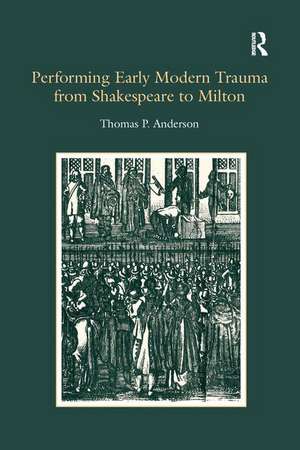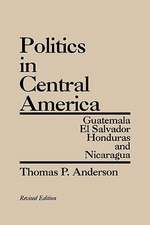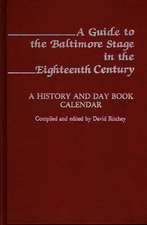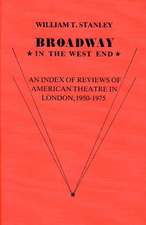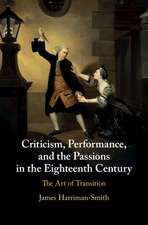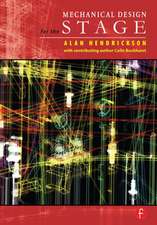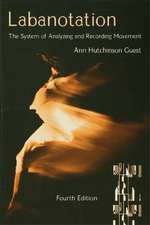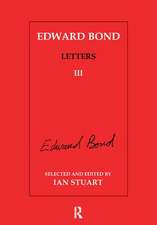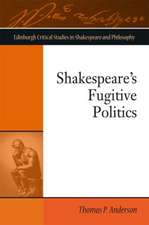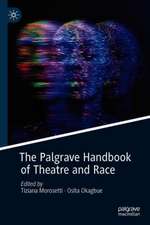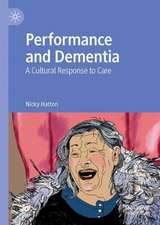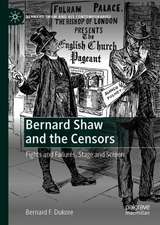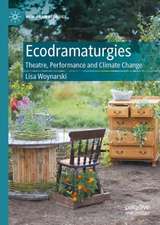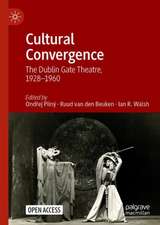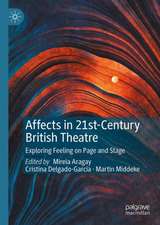Performing Early Modern Trauma from Shakespeare to Milton
Autor Thomas P. Andersonen Limba Engleză Paperback – 9 sep 2016
| Toate formatele și edițiile | Preț | Express |
|---|---|---|
| Paperback (1) | 324.24 lei 6-8 săpt. | |
| Taylor & Francis – 9 sep 2016 | 324.24 lei 6-8 săpt. | |
| Hardback (1) | 820.71 lei 6-8 săpt. | |
| Taylor & Francis – 28 feb 2006 | 820.71 lei 6-8 săpt. |
Preț: 324.24 lei
Preț vechi: 439.59 lei
-26% Nou
Puncte Express: 486
Preț estimativ în valută:
62.04€ • 64.78$ • 51.23£
62.04€ • 64.78$ • 51.23£
Carte tipărită la comandă
Livrare economică 15-29 aprilie
Preluare comenzi: 021 569.72.76
Specificații
ISBN-13: 9781138274853
ISBN-10: 1138274852
Pagini: 248
Dimensiuni: 156 x 234 mm
Greutate: 0.46 kg
Ediția:1
Editura: Taylor & Francis
Colecția Routledge
Locul publicării:Oxford, United Kingdom
ISBN-10: 1138274852
Pagini: 248
Dimensiuni: 156 x 234 mm
Greutate: 0.46 kg
Ediția:1
Editura: Taylor & Francis
Colecția Routledge
Locul publicării:Oxford, United Kingdom
Cuprins
Contents: Introduction: Performing trauma. Part 1 Haunting Allegories: Reading martyred history in Titus Andronicus; Richard II and the politics of murder; Edward II and the aesthetics of survival. Part 2 Exhuming Effigies: The art of playing dead in revenge tragedy; Representing regicide: royal death and renaissance distraction; Bibliography; Index.
Notă biografică
Thomas Anderson, Assistant Professor of English at Mississippi State University, USA. He has also taught English at Vanderbilt University and Southern New Hampshire University. He has published articles on Shakespeare, Marvell, Milton, and other early modern writers.
Recenzii
'A stunningly intelligent, deeply provocative book that intervenes in many different areas of early modern studies simultaneously.' Peter C. Herman, San Diego State University, USA, author of Destabilizing Milton: 'Paradise Lost' and the Poetics of Incertitude 'Anderson's book surveys an impressive array of dramatic and poetic texts... The achievements, as well as implications, of this effort are considerable... Anderson's method represents a fresh approach to historicist readings of early modern literature and that literature's engagement with the past... Anderson's methodology generates a series of original, illuminating comparisons... Anderson's work is striking... engages a wide swath of English Renaissance literature and history with theoretical insight and sensitivity to close detail... this book offers a substantial correction to contextualizing scholarship by tackling the literary presentation of history from a theoretical - principally psychoanalytic - perspective, weaves together an impressive array of texts, and provides original, sharp close readings.' Shakespeare Quarterly ’... each of the book's chapters offers the reader illuminating readings that are as attentive to the literary as to the historical in their working out of the overall argument's logic... Anderson's book will be of interest not only to scholars working in the field of early modern English literature and culture but also to those who are interested in the intersection of trauma theory and pre-twentieth-century history.’ Renaissance Quarterly ’Anderson's highly stimulating book thoughtfully engages with contemporary theory at the same as it shows the author's in-depth knowledge of a range of early modern English authors...’ College Literature ’The book is painstakingly researched and thoroughly supported, providing both comprehensive notes and detailed bibliography... it contributes interesting lines of inquiry into the performance of memory and history in early mode
Descriere
An examination of political and cultural acts of commemoration, this study addresses the connection of representation of violence in literary works to historical traumas such as royal death, secularization and regicide. Incorporating contemporary theories of trauma, Thomas Anderson here analyzes works by Shakepeare, Marlowe, Webster, Marvell and Milton. By interrogating the difficulty in representing historical crises in poetry, drama and political prose, Anderson demonstrates how early modern English identity is the fragile product of an ambivalent desire to flee history.
